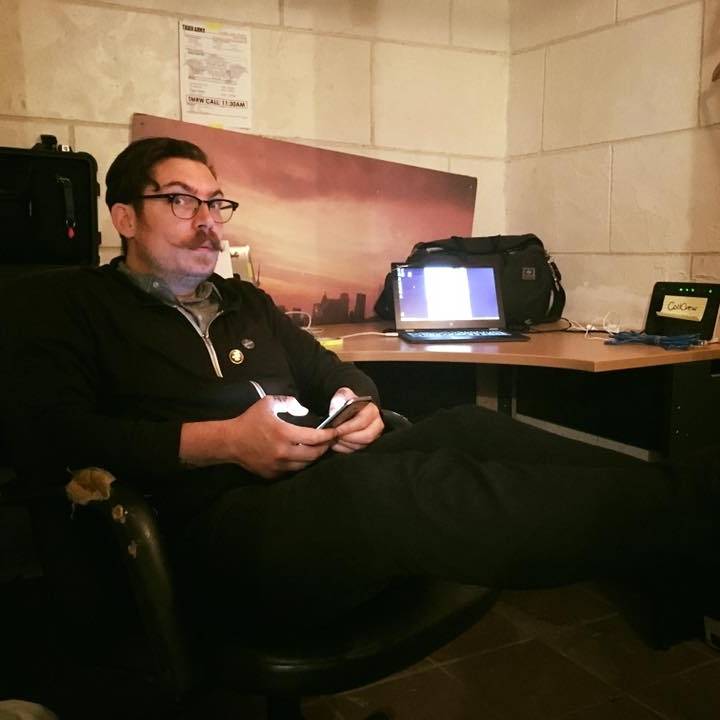Let’s entertain a hypothetical question.
You’re a diehard music fan. One summer, you and some friends head up to Chicago for a tour. You find yourself hanging out with a band on a bus, and you travel with them for a little while. When the time comes for you to get off, they ask you to stay. Indefinitely.
Is this not an incredible dream come true?
Most people would emphatically say yes. I mean, getting to personally know a band you love while travelling around and watching them play every day? What an adventure. What if you could do it… forever?
Like most Kerouacian things, this concept is incredibly romantic. But also like those things, this isn’t really a concept that is meant to be sustained. There has got to be some grounding in reality. But, it is possible to sustain this living dream if you wake up a little bit.
Just ask Matt Maly, who will tell you that it’s all about balance. The hypothetical is his real life story. Maly is a professional tour manager and a front of house audio engineer. This means that he accompanies bands on their tours and works for them in certain capacities.
“I got kidnapped by some band friends that were going to Warped Tour. I needed a ride from Milwaukee to Chicago, thinking they would give me a ride after the show. But they said, ‘Why don’t you just stay on the bus for a couple of days? And we’ll drop you off when the tour actually hits Chicago, so we don’t have to pull over.’ That day came, that day went, and they said, ‘Why don’t you just stay? We’ll get you a ride home from Detroit when it’s over.” Six weeks later, I had spent my summer on the Vans Warped Tour.”
That was in 2006. He’s been keeping it going for over a decade.
Maly is based in Champaign, and it’s where he lays his head when not on tour. Graduating from U of I with a degree in East Asian Language and Culture, Maly is not shy about saying that his degree does not come into play for his career. His other talents are more important. When we sit down to talk, it’s clear to me that Maly is shrewd, creative, and tenacious. His career literally consists of bus hopping; his most recent job was as both the tour manager and front of house audio engineer for the band Tiger Army, “a three-piece rockabilly/psychobilly act from California,” and his next one is a month-long tour with the 90’s alternative act Violent Femmes.

There is a very distinct polarization to what Maly does — the business side, and the artistic side. The business aspect is found largely in his gigs as tour manager, which is a generalized term that encompasses a wide variety of tasks. As TM, Maly does everything from handling the band’s accommodations and travel logistics, to taking care of finances, to being the middle man between the band and their general manager. Often, he will also play “band dad,” effectively wrangling the crew and making sure things get done. He neutralizes little problems and headaches and shields his clients from them if he can. It’s a many-hats job, and Maly has to continually stay on his toes. He speaks of relationships with band managers as TM:
“Some managers are proactive and some are reactive. Some want to know what’s going on — they’re asking questions, ‘how was the show tonight?’ et cetera. They’re much more in touch, depending on how much they care about the job and the artist. Then there are managers that give me more responsibility. They’re just like, ‘You’re on the road, so you’re the manager. Let me know when the money gets put in the bank.’ Sometimes, there is no manager, and it’s the artist directly, and I end up kind of taking on some of the responsibilities of the band manager.”
The artistic side of what Maly does is found primarily in his front of house engineer role. The FOH is responsible for how the band sounds live. Maly controls the mixing and governs what you hear when you see a show. He makes sure it’s exactly what you’re supposed to be hearing, striving to make the music sound as close as possible to what the band wants. Maly says he definitely prefers audio engineering, largely because of the little headaches that his tour manager role entails. They’re often comical.
“It’s nice to not have to deal with the unpredictable nature of an artist. That can be very strange — stuff like, ‘[The artist] doesn’t like that the hotel is on this side of the street, so I have to change the hotel and move everyone.’ You’re responsible for a lot.”
It’s no surprise that he prefers the artistic aspect of his career because it’s the art of music that intrigued him in the first place. It’s the passion of it that can hook you. But Maly has turned that giddy notion pragmatic in its own creative way. It’s a real career for him. He stresses several times during our conversation that the business aspect of his career is crucial. It’s how he sustained things.
———
SP: What compelled you to keep on and make this a career?
Maly: Well I really love music, and the first tour was just that much of an adventure so that I wanted to do it again. So I went out the next summer with the same band on a smaller tour with small clubs, VFW halls, and it was still fun – sleeping on people’s floors, not having a nine to five, and going out and doing the weirdest things I could think of.
SP: Why do you think it was that they originally decided to keep you on that bus? What were you doing for them?
Maly: Well, I was only selling merch then. But I was hanging out with friends, getting stuff done, and hanging with a bunch of bands too. And it slowly evolved over the years, adding on in responsibility. I proved to be handy with numbers, learned how to do sound on the road, and all kind of things. As that grew, it became an actual job.
———

Maly does this for a living — If you’re working a job, you’ve got to get paid. He has taken longer gigs over short ones because they pay better. He’ll go with a more lucrative gig rather than one he might like more. He’s still always looking out for adventure there, though, even if he’s not fully with the scene.
“Once I toured with this unnamed rapper…. I didn’t dig the scene and I couldn’t hang, but we played a lot of festivals and other cool venues. It ended up being a lot of fun, and also paying very well. A few years ago I worked for a young Canadian woman who ended up being the opener for a new artist by the name of Justin Bieber. This was his first arena tour. That was interesting.”
Also contrary to assumptions, Maly says his work isn’t about partying all the time, either. It depends on the current job.
“I do have jobs where if I didn’t hang out and party, I probably wouldn’t get along with them as much. Then I have jobs where it is a job — cut and dry. You punch in, you do your job, and once the trailer is packed up at the end of the night, then you can open a drink. I go through cycles of my liver being the strongest organ in my body and cycles of not drinking whatsoever.”
Maly is constantly adjusting himself to new situations and surroundings. It’s his business to get to know things for a while, and then switch it up for something entirely different, as he works with several bands a year — six or seven this time around, he says. He’ll often have his work schedule planned out for several months. Sometimes bands will take him on for an entire album cycle.
It proves that this line of work isn’t necessarily about spontaneity. Security is important. Maly says he makes a habit of saving up three months’ worth of income, which I find oddly responsible. But again, why should that be? Just because your life story has an Almost Famous theme going on doesn’t mean that you have to party forever. Because you really can’t party forever, and it gets boring after a while. If you really want to follow the music indefinitely, you’ve got to be practical about it.
Maly says he hopes to be doing what he does until he’s fifty years old, or longer. I think he’s got excellent odds of getting there.
———
SP: How would you advise someone who wants to get into your line of work?
Maly: I got into this with luck. I would definitely say, do not attend the schools that are associated with this. This is not a trade that is taught in a class. You have to work it, get the experience through a large venue and be personal and friendly towards bands. But don’t pay someone thinking you’ll get the opportunity to do this, because the music industry is full of people looking to make a quick buck. The phrase “fake it ‘til you make it” is crucial in my industry. It’s hard work and the ability to learn on your feet and pretend that you’ve got it is essential. It takes time and luck. I got kidnapped by a band with a bus, and when I thought it was my turn to get off the bus, it wasn’t the case. Ten years later…. yeah.








